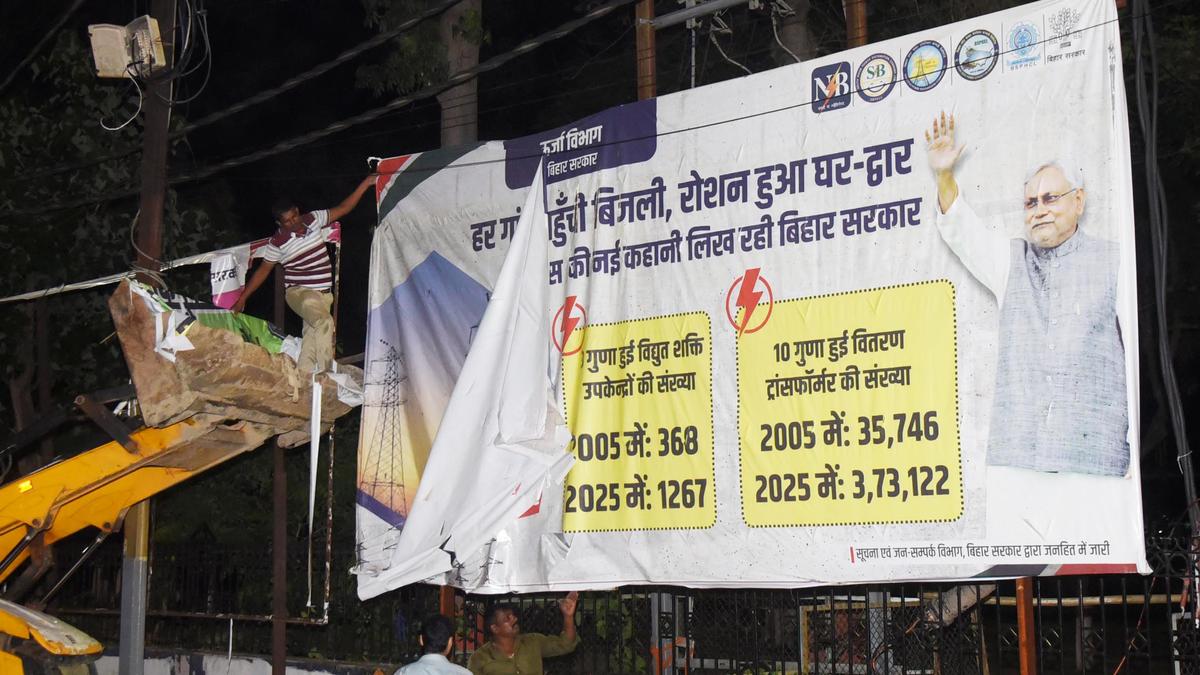Workers remove posters of political parties after implementation of the Model Code of Conduct ahead of the Bihar Assembly election in Patna. File
| Photo Credit: ANI
Ambedkar famously remarked in the Constituent Assembly, “However good a Constitution may be, it is sure to turn out bad because those who are called to work it happen to be a bad lot”. Well, it applies equally to any law or code framed for functioning of the country and its various public processes.
The Model Code of Conduct (MCC) for guidance of political parties and candidates is a set of norms which has evolved with the consensus of political parties. They have consented to abide by the principles embodied in the said code. It binds them to respect and observe it in its letter and spirit. This code began to be implemented strictly in the 1990s and has been revised in 2013 by the Election Commission of India (EC).
The MCC is operational from the date on which the election schedule is announced until the date of announcement of result.
The MCC lays down code for general conduct during campaign process by political parties and contesting candidates. With respect to the party or parties in power, it stipulates that ministers and other authorities shall not announce any financial grants, promise any construction of roads or provision of drinking water, announce new projects, lay foundation stone for projects or schemes of any kind which may have the effect of influencing the voters in favour of the party or parties in power.
Violations galore
The MCC is a voluntary set of norms to be followed by political parties and candidates. It is by itself not legally enforceable. Violations of certain provisions of the MCC with respect to campaign process can be enforced through invoking corresponding provisions in criminal laws and the Representation of the People Act, 1951 (RP Act). However, it is the announcement of financial grants or of new projects by the ruling government just before elections that can vitiate the level playing field thereby impairing free and fair elections. The code does not restrict grants or disbursements under ongoing programmes on the date of announcement of elections.
A famous quote from Hamlet goes, “more honoured in the breach than in the observance”. This is meant for customs and laws that are better off being ignored than being followed. In the Indian electoral context, however, it has become a norm to breach the codes and laws. Politicians find ingenious ways of circumventing the MCC when it comes to announcement of projects or distribution of grants.
Cash politics
The recent example is the launch of Mukhyamantri Mahila Rojgar Yojana (MMRY) in Bihar in August 2025. Under the scheme, women are eligible to receive ₹10,000 as grant for self-employment and livelihood opportunities. The disbursements started on September 26, 2025 with the Prime Minister transferring the grant to 75 lakh women. Subsequently weekly instalments are being transferred to beneficiaries since October with recent one being on October 31 and the next on November 7. One-time cash transfer to the underprivileged and needy women, despite its fiscal burden on the state, does provide some much-needed succour.
However, with the elections scheduled to be held in two phases on November 6 and November 11, it is a valid criticism that this is breaking the MCC in spirit and influencing voters in favour of the ruling party through direct cash transfers. Taking refuge under the guise of an ongoing scheme, which was anyway launched just a month before the announcement of elections, does not seem kosher.
It is not the first time that MCC has been broken in spirit when it comes to announcements of new projects just before elections. Successive ruling governments at both the Centre and various States, representing the entire spectrum of political parties in India, are guilty of this breach. The MMRY scheme, nonetheless, does push the dubious envelope of such breach to a new low.
Stop the sham
In 2013, the Standing Committee on Personnel, Public Grievances, Law and Justice, recommended making the MCC legally binding. However, the EC is not in favour since the elections have to be completed within a relatively short period of around 45 days while judicial proceedings take longer.
There has been criticism directed at the EC for turning a blind eye to such blatant violations of the MCC, if not in letter but in spirit. However, considering the Machiavellian ability of our political leaders to invent new ways of working around election laws, even the sincerest attempts in curbing such practices would be a wild goose chase.
“It is much more important to kill bad laws than to pass good ones,” said the former U.S. President Calvin Coolidge. It may be apt to apply this to most parts of MCC that deal with government schemes and projects. Violation of code with respect to campaign process can be suitably dealt with by the EC under its existing powers.
However, the MCC guidelines that stipulate no fresh projects or financial grants after announcement of elections can be done away with as they are more breached in spirit than followed.
What is the Model Code of Conduct? | Explained
One of the arguments for conduct of simultaneous elections to Lok Sabha and State Assemblies is to minimise the impact of MCC that restricts new government programmes and schemes with multiple elections every year. Scrapping these provisions in MCC would at least result in one farcical reason being less for the arguments in favour of simultaneous polls.
Rangarajan R is a former IAS officer and author of Courseware on Polity Simplified. He currently trains at Officers IAS Academy. Views expressed are personal.
Published – November 06, 2025 01:04 am IST

